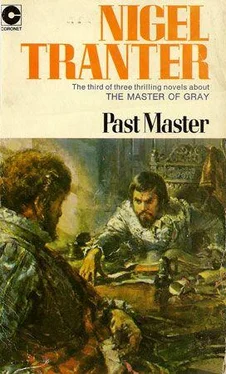Nigel Tranter - Past Master
Здесь есть возможность читать онлайн «Nigel Tranter - Past Master» весь текст электронной книги совершенно бесплатно (целиком полную версию без сокращений). В некоторых случаях можно слушать аудио, скачать через торрент в формате fb2 и присутствует краткое содержание. Жанр: Исторические приключения, на английском языке. Описание произведения, (предисловие) а так же отзывы посетителей доступны на портале библиотеки ЛибКат.
- Название:Past Master
- Автор:
- Жанр:
- Год:неизвестен
- ISBN:нет данных
- Рейтинг книги:5 / 5. Голосов: 1
-
Избранное:Добавить в избранное
- Отзывы:
-
Ваша оценка:
- 100
- 1
- 2
- 3
- 4
- 5
Past Master: краткое содержание, описание и аннотация
Предлагаем к чтению аннотацию, описание, краткое содержание или предисловие (зависит от того, что написал сам автор книги «Past Master»). Если вы не нашли необходимую информацию о книге — напишите в комментариях, мы постараемся отыскать её.
Past Master — читать онлайн бесплатно полную книгу (весь текст) целиком
Ниже представлен текст книги, разбитый по страницам. Система сохранения места последней прочитанной страницы, позволяет с удобством читать онлайн бесплатно книгу «Past Master», без необходимости каждый раз заново искать на чём Вы остановились. Поставьте закладку, и сможете в любой момент перейти на страницу, на которой закончили чтение.
Интервал:
Закладка:
Mary Gray, of course, had been agitating to be taken on this important voyage also, the more so as it might well be a prolonged one. Hitherto her pleas had been unsuccessful. The arrival of the Countess Agnes however put a different complexion on the matter. Argyll would not hear of his mother being left behind at Duart, a young man now trusting no one but himself; and if the Countess was to sail with them, Mary claimed that there was no valid reason why she should be forbidden. Argyll, grateful to the girl for what she had revealed to him that day at Castle Campbell, and seeing her as company for his mother, backed her plea, offering to take her in his own vessel. Ludovick, actually delighted to have her company, could not refuse, however much Maclean might scoff at the idea of women in war galleys.
When the combined fleet, therefore, sailed from Duart only a couple of hours after Argyll's arrival, Mary shared the stern cabin of the Earl's galley with the Countess and her maid, while Ludovick, as before, accompanied Lachlan Mor. In the event of battle, it was agreed that Argyll himself would transfer to another Campbell galley leaving this craft to keep well out of danger's way.
They drove down the Firth of Lorne, a magnificent sight in the gold and shadow of the evening sunlight, the largest fleet seen in these narrow waters for many a long day – over forty galleys and a dozen birlinns, but nothing more slow such as might hold them back. The MacDonalds had a sizeable start, but they had somewhat further to sail, and would be delayed inevitably by the craft, slower than the galleys, which they were having to use as additional transports. Almost certainly they were making for the Irish rebel stronghold area of Ballycastle in Antrim, and Maclean hoped and anticipated that they would keep fairly close in to the Scottish coast, amongst the islands, until opposite the northern tip of Antrim, lie anchored in some remote and sheltered bay overnight, and then in the early morning make a swift dash across the North Channel, the shortest direct crossing – this in order to avoid losing any of their slower vessels during the night, and also to avoid being spotted by the watchdogs of Elizabeth's navy which patrolled these Irish waters continuously. The one great danger which Donald Gorm had to fear was to be caught by a squadron of English ships of war and galleons, in a position where his superior speed and manoeuvrability could not save him – for compared with these the galleys were cockleshells and could be sunk with ease by the others' vastly greater fire-power and longer range. Sir Lachlan was going to take the risk of sailing all night, even through these dangerous reef-strewn seas, in order to steal a march on his enemy.
The wind, though much moderated, was still north-westerly. This, for the sake of speed, meant that Maclean should take the most southerly course possible, once out of the Firth of Lorne – that through the narrows of the Sounds of Luing and Jura. Donald Gorm, who would probably reach the same waters via the Sound of Islay – and it was no part of Lachlan Mor's strategy to engage in a stern-chase and open battle with sixty MacDonald galleys as against his own forty. He required surprise to aid him outnumbered as he was, and planned accordingly. Emerging therefore from the comparatively sheltered waters of die Firth, instead of south he swung round almost due west, half into wind and seas – to the immediate reduction of their speed. Passing to the north of the jagged fangs of the Garvelloch Isles, dipping and tossing and leaving behind a drifting cloud of spray from a couple of thousand lashing oar-blades, they made directly for the open sea.,
Nearing the long island of Colonsay, and night coming down, Maclean signalled for all his galleys to close in, reef sails, and reduce speed. From now on the most intense care was demanded of every captain. Few commanders would or could have risked this endeavour, for there was sail some twenty miles of rock- and skerry-infested waters to be covered, including the far-flung menace of the Torran Rocks, before the final isolated reefs of Dubh Heartach were reached and they could turn due south in clear deep sea. For over fifty ships to thread this vicious maze in formation, in darkness, demanded a discipline and standard of navigation ill at odds with the wild appearance of this clan host. Led by Sir Lachlan's own galley, the vessels must proceed three abreast and only one ship's length behind the trio in front, each guided by the white splashes of its leaders' and neighbours' oars. Course-changing would be ordered by a code of signals blown on horns and passed back from ship to ship. Hector Ruari and Lachlan Barrach alone were exempted from these strict commands; almost as expert as their father, they were to act as sheep-dogs for the convoy, to watch for stragglers, round up and warn off, as necessary – an onerous task indeed in the darkness.
Ludovick, fascinated by it all, could by no means curl up in a plaid and sleep, as advised by Maclean, but stood hour after hour on the heaving forecastle of the leading ship, chilled as he was, while admiration for the older man's brilliant seamanship, swift decision and uncanny instinct, grew upon him. Time and again his heart was in his mouth as sudden spouting seas to left or right hissed and snarled dire danger. But not once did Sir Lachlan show hesitation, alarm, or even anxiety. The lives of up to five thousand men depended upon his sole and instant judgment, but he revealed no hint of strain or excitement.
Mary, for her part, was no more prepared to sleep, whatever the comforts available. She found the Countess a proud and haughty woman younger-seeming than might have been expected considering that, before she had married the Earl's father and former Chancellor, she had been the widow of the famous Earl of Moray, Regent of Scotland and eldest half-brother of Mary the Queen – a child-wife she must have been, surely, for the Regent was dead twenty-five years. She was a Keith, daughter of the fourth and sister of the present Earl Marischal. Full of her woes now, she was apparently more outraged by the blows to Argyll pride than distressed by loss or danger. Mary discovering the more sympathy for the Earl and his brother, preferred their company up at the galley's prow. Their vessel, of course, was deep in the centre of the flotilla, sandwiched between others, with responsibility only for maintaining position -but even so the situation absorbed the girl. She knew no fear, but recognised the danger, savouring the spice of it. Peering into the blackness ahead and around, and seeing only the vague outline of the ship in front and the wan white of oar-thrashed water, listening to the hissing rush of the waves, the whine of wind in cordage, the creak of timbers and oars, and the gasping refrain of the rowers, she knew a strange exhilaration that desired only that this should go on and on, that it should not stop, a feeling that she and the sea and the night were one. Even when young Colin Campbell, shivering, went below, and Argyll urged her to do likewise, she shook her damp head and remained standing at his side, wrapped in a wet plaid, hair plastering her face, licking the salt spray from her lips. Although they scarcely exchanged a word throughout, some affinity developed there between the girl and the restrained, sombre, dark-browed young man, an affinity unexpressed and unstressed, yet which would hold Archibald Grumach Campbell, in some measure, for the rest of his life. Frequently, inevitably, with the lurching of the ship, they staggered against each other; sometimes she grasped his arm for support, sometimes he held her firmly.
It was nearly midnight before an eerie winding of horns from front to rear of the fleet proclaimed that they were past the unseen pillar of Dubh Heartach and its savage outliers, and a change of course of almost ninety degrees was ordered. No more navigational hazards now lay between them and the north coast of Ireland, sixty miles south. The same formation was still to be kept, but with much more space allowable between ships. Sails were hoisted and speed picked up, reliefs of rowers taking over. Tension relaxed everywhere.
Читать дальшеИнтервал:
Закладка:
Похожие книги на «Past Master»
Представляем Вашему вниманию похожие книги на «Past Master» списком для выбора. Мы отобрали схожую по названию и смыслу литературу в надежде предоставить читателям больше вариантов отыскать новые, интересные, ещё непрочитанные произведения.
Обсуждение, отзывы о книге «Past Master» и просто собственные мнения читателей. Оставьте ваши комментарии, напишите, что Вы думаете о произведении, его смысле или главных героях. Укажите что конкретно понравилось, а что нет, и почему Вы так считаете.












